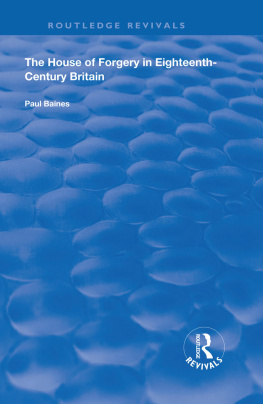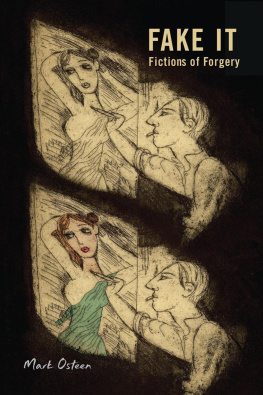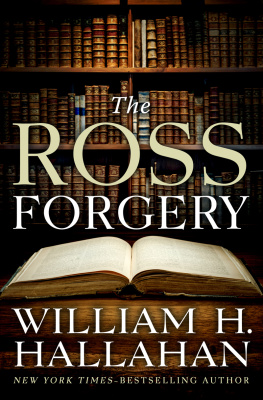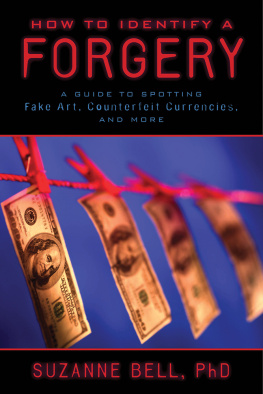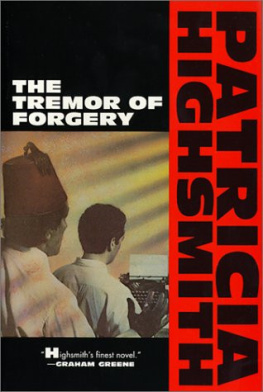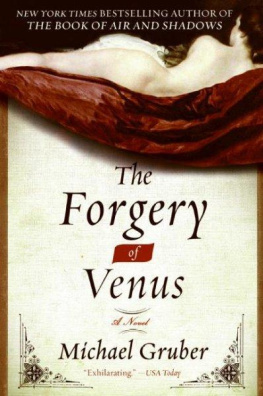THE HOUSE OF FORGERY IN EIGHTEENTH-CENTURY BRITAIN
To my parents
The House of Forgery in Eighteenth-Century Britain
Paul Baines
First published 1999 by Ashgate Publishing
Reissued 2019 by Routledge
2 Park Square, Milton Park, Abingdon, Oxon, OX14 4RN
52 Vanderbilt Avenue, New York, NY 10017
Routledge is an imprint of the Taylor & Francis Group, an informa business
Copyright Paul Baines, 1999
The author has asserted his right under the Copyright, Designs and Patents Act, 1988, to be identified as the author of this work.
All rights reserved. No part of this book may be reprinted or reproduced or utilised in any form or by any electronic, mechanical, or other means, now known or hereafter invented, including photocopying and recording, or in any information storage or retrieval system, without permission in writing from the publishers.
Notice:
Product or corporate names may be trademarks or registered trademarks, and are used only for identification and explanation without intent to infringe.
Publisher's Note
The publisher has gone to great lengths to ensure the quality of this reprint but points out that some imperfections in the original copies may be apparent.
Disclaimer
The publisher has made every effort to trace copyright holders and welcomes correspondence from those they have been unable to contact.
A Library of Congress record exists under LC control number:
ISBN 13: 978-0-367-19545-8 (hbk)
ISBN 13: 978-0-429-20307-7 (ebk)
Contents
Guide
The research for this book was begun while I was a postgraduate student at the University of Bristol; it was continued during my tenure of a Junior Research Fellowship at St John's College, Oxford, and during periods of study leave and teaching remission at the Department of English Language and Literature, University of Liverpool. To all those who have made that time possible I am deeply grateful. The research has been conducted in the British Library, the Bodleian Library, the National Library of Scotland, the Public Record Office, the Institute of Historical Research, Bristol Central Library and the University Libraries of Cambridge, Bristol, Liverpool, Edinburgh and London. The Libraries of the Universities of Michigan and Cincinnati, and the Huntington Library, have provided xeroxes of otherwise unavailable material. I am pleased to acknowledge the generous professional assistance I have received from members of staff in all these institutions.
Exploratory versions of several chapters have appeared in various journals, sometimes in longer form: Literature and History, Durham University Journal, Poetica, British Journal for Eighteenth-Century Studies, and Angelaki. References to these earlier incarnations are given in the appropriate chapters; thanks are due to the editors and publishers of the journals for permission to recast the material here. Further documentation of the historical material can be found in my doctoral thesis, 'Authenticity and Forgery in Eighteenth-Century Britain', University of Bristol, 1988. To the immensely knowledgeable supervisor of that thesis, Professor Pat Rogers, now of the University of South Florida, I owe a special debt of gratitude. I would also like to thank Dr Penny Wilson of the University of Cambridge for her encouragement of the embryonic project which has slowly led to this book. Others who have freely given of their time and expertise, sometimes without noticing it, are Professor John Burrow, Professor Howard Erskine-Hill, Dr Nick Groom, Professor Brean Hammond, Dr David Hopkins, Professor Roger Lonsdale and Professor Rosamund McGuinness. Heather Larmour prepared the statistical appendix. My wife Katy Hooper has advised me in many professional capacities: rare books librarian, archivist, and copyeditor; she has also been an unfailing support in the various sloughs of despond into which a project of this kind is liable to precipitate its author.
The following short titles and abbreviations are used throughout:
- Commons Journals: Journals of the House of Commons (in progress, 1804-)
- Correspondence of Pope: The Correspondence of Alexander Pope, edited by George Sherburn, 5 vols (Oxford, 1956)
- English Reports: The English Reports, 176 vols (1900-1930)
- Johnsonian Miscellanies: Johnsonian Miscellanies, edited by George Birkbeck Hill, 2 vols (Oxford, 1897)
- Letters of Johnson: The Letters of Samuel Johnson, with Mrs. Thrale's Genuine Letters to him, edited by R. W. Chapman, 3 vols (Oxford, 1952)
- Life of Johnson: James Boswell, Boswell's Life of Johnson, edited by George Birkbeck Hill, revised by L. F. Powell, 6 vols (1934-1951)
- Lives of the English Poets: Samuel Johnson, Lives of the English Poets, edited by George Birkbeck Hill, 3 vols (Oxford, 1905)
- Lords Journals: Journals of the House of Lords (in progress, 1767-)
- Nichols, Anecdotes: John Nichols, Literary Anecdotes of the Eighteenth Century, 9 vols (1812-1815)
- Nichols, Illustrations: John Nichols, Illustrations of the Literary History of the Eighteenth Century, 8 vols (1817-1858)
- OBSP: The Proceedings on the King's Commission of the Peace, Oyer and Terminer, and Gaol-Delivery of Newgate, Held for the City of London and county of Middlesex at Justice-hall, in the Old Bailey, published eight times a year after each sessions, and referenced in this book by date.
- OED: The Oxford English Dictionary, second edition, 20 vols (Oxford, 1989)
- Twickenham Edition: The Twickenham Edition of the Poems of Alexander Pope, general editor John Butt, 11 vols (1939-1969)
- Walpole's Correspondence: The Yale Edition of Horace Walpole's Correspondence, edited by W. S. Lewis and others, 48 vols (New Haven, 1937-1983)
In notes and references, place of publication is London unless otherwise stated.
In 1990 the British Museum mounted an exhibition called Fake? The Art of Deception, which drew together relevant objects from a huge range of artistic and ethnological collections - sculptures, paintings, enamels, metalwork; manuscripts, printed books, newspapers; brand-name imitations, medieval relics, political propaganda and tourist spuriosa - 'the material evidence of the myriad deceptions practised by men upon their fellows over three millennia', as the editor of the accompanying book put it. Visitors to the exhibition were swamped by the sheer proliferation of objects; from this plethoric evidence of misdemeanour, one might have concluded that forgery was a constant feature across history, that the forger has always been with us. All human cultures seemed in this arrangement to be permeated by a spirit of fraudulence.
On the other hand, we can tell the genuine from the false; we know what a forgery is, and once detected, it can be utilized as a kind of unconscious index to the cultural needs and perceptual grammars of its true period and place of origin.
A more powerful assertion of that essential position is to be found in Anthony Grafton's Forgers and Critics (1990). Grafton's theme is forgeries and their detection in the field of classical humanistic scholarship and his main purpose is to discover an archetypal pattern to which both forgeries and the techniques which lead to their discovery conform. The paradigm does not shift:
The basic techniques and topoi by which forgers evoke belief, the basic willingness of many readers and even experts to be deceived, and the basic fact that apparently firm documents are often deeply dubious have remained unchanged. So has the rhythm by which criticism develops, demand-driven, as new ways of forging require new methods of detection.

